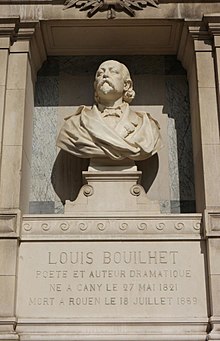You can help expand this article with text translated from the corresponding article in French. (August 2010) Click for important translation instructions.
|
| Louis Bouilhet | |
|---|---|
 Louis Bouilhet by Étienne Carjat, in 1864 Louis Bouilhet by Étienne Carjat, in 1864 | |
| Born | 27 May 1821 Cany-Barville, France |
| Died | 16 July 1869(1869-07-16) (aged 48) Rouen, France |
| Occupation(s) | Playwright, poet |

Louis Hyacinthe Bouilhet (27 May 1821 – 18 July 1869) was a French poet and dramatist.
Bouilhet was born in Cany, Seine Inférieure. He was a schoolfellow of Gustave Flaubert, to whom he dedicated his first work, Melaenis, conte romain (1851), a narrative poem in five cantos dealing with Roman manners under the emperor Commodus. His volume of poems Fossiles attracted considerable attention for being an attempt to make science a subject for poetry. These poems were also included in his Festons et astragales (1859).
As a dramatist he was successful with his first play, Madame de Monlarcy (1856), which ran for 28 nights at the Odéon; Hélène Peyron (1858) and L'Oncle Million (1860) were also favorably received. Of his other plays, only Conjuration d'Amboise (1866) met with any real success.
Bouilhet died on 18 July 1869, at Rouen. Flaubert published his posthumous poems with a notice by the author in 1872.
Bouilhet was Flaubert's mentor and guide; Flaubert never wrote anything without his advice. A few months after Bouilhet's death in 1869, Flaubert wrote about his old friend, "When I lost my poor Bouilhet, I lost my midwife, the man who saw more clearly into my mind than I did myself." According to Starkie, Maxime Du Camp, who knew Bouilhet and Flaubert well, said of the two authors, "It was Bouilhet who was the master, in the matter of literature at least, and that it was Flaubert who obeyed." Throughout their lives, Flaubert referred to Bouilhet as "Monseigneur."
See also
References
 This article incorporates text from a publication now in the public domain: Chisholm, Hugh, ed. (1911). "Bouilhet, Louis Hyacinthe". Encyclopædia Britannica (11th ed.). Cambridge University Press.
This article incorporates text from a publication now in the public domain: Chisholm, Hugh, ed. (1911). "Bouilhet, Louis Hyacinthe". Encyclopædia Britannica (11th ed.). Cambridge University Press.- Maxime Du Camp, Souvenirs littéraires (1882)
- H. de la Ville de Mirmont, Le Poète Louis Bouilhet (1888)
- Enid Starkie, "Flaubert: The Making of the Master" (1967)
- Enid Starkie, "Flaubert the Master" (1971)